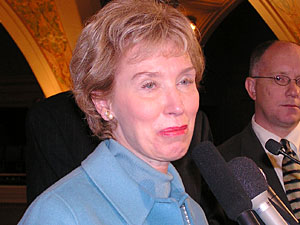Photos
More from MPR
Your Voice
| ||||||||||||||||||||||||||||||||||||||||||||||||||||||||
House education bill shifts integration aid from city schools
April 1, 2004
 |
| Rep. Alice Seagren, R-Bloomington, chairwoman of the House K-12 Finance Committee, says she understands the frustration over no new funding for schools. (MPR Photo/Laura McCallum) |
St. Paul, Minn. — Republican leaders in the Minnesota House say they're carrying their vision for public education forward despite tough economic times. The House education bill includes several school reform initiatives, but provides little money to see them through. Rep. Alice Seagren, R-Bloomington, chairwoman of the House K-12 Finance Committee, sponsored the $8 million package.
"I understand members the frustration when we have had a year with no funding for schools and that everybody is desperately wanting to figure out how to have more money," Seagren said. "It's been tight financially."
That financial frustration bubbled over with the passage of an amendment that allows school districts throughout Minnesota to tap into the state money now earmarked for urban school districts and their adjacent suburban neighbors. Rep. Marty Seifert, R-Marshall, pushed for the change to the integration aid funding formula. He says the adjustment still recognizes the challenges of inner-city schools but provides a hint of fairness to rural districts.
"We will no longer stand idly by while manipulated formulas from the last 30 years continue to be done, the status quo remains and we will not challenge the sacred cow status of these formulas that have developed over the last few years," Seifert said. Under the shift, schools in Minneapolis, St. Paul and Duluth would lose state money. St. Paul would take the biggest hit, about $10.5 million. Most other districts would gain an extra $29 dollars per student. Representative Seagren warned the action could damage the existing voluntary programs to integrate schools.
|
Minnesota needs bold new initiatives.
- Rep. Matt Entenza, DFL-St.Paul |
"I don't think that this is the way we solve our problems, by dividing ourselves as a state between suburbs and rural and urban," Seagren said. "I think this is the wrong thing to do."
Lawmakers attached the funding shift to a larger bill that advances much of Gov. Pawlenty's education agenda. The legislation helps rural schools pay for Internet access, links driving privileges to school attendance and establishes alternative teacher training programs that encourage qualified professionals to work in schools. The bill also establishes a watered down version of the "super teachers" plan, which would provide financial rewards to educators who turn around struggling schools. Three pilot schools will share $500,000 beginning in 2006.
House Democrats sharply criticized the education package. Minority Leader Matt Entenza, DFL-St. Paul, says the bill tinkers on the margins.
"Minnesota needs bold new initiatives," Entenza said. "But what we've seen here today is political gamesmanship, amendments designed to put on election leaflets, instead of the new initiatives we need to make Minnesota education the strong environment it needs to be for our students and communities."
The DFL-controlled Senate is finishing up its own set of education policy proposals. The Senate's education policy bill would eliminate the state's five-star grading system for schools and replace the Minnesota Comprehensive Assessments with a new group of tests. The bill endorses an alternative set of social studies standards for schools and calls for additional state requirements in physical education and world languages. The Senate bill also establishes achievement grants for schools. Sen. Steve Kelley, DFL-Hopkins, chairman of the Senate Education Committee, says he'd rather reward schools than take the super teachers approach.
"The goal is to create an effective learning community in a school and have teachers working as a team," Kelley said. "By thinking about the performance of the school as a whole rather than individual teachers, we thought that would be a more effective way of closing the learning gap."
The Senate will consider K-12 spending issues in a separate bill.
|
News Headlines
|
Related Subjects
|

